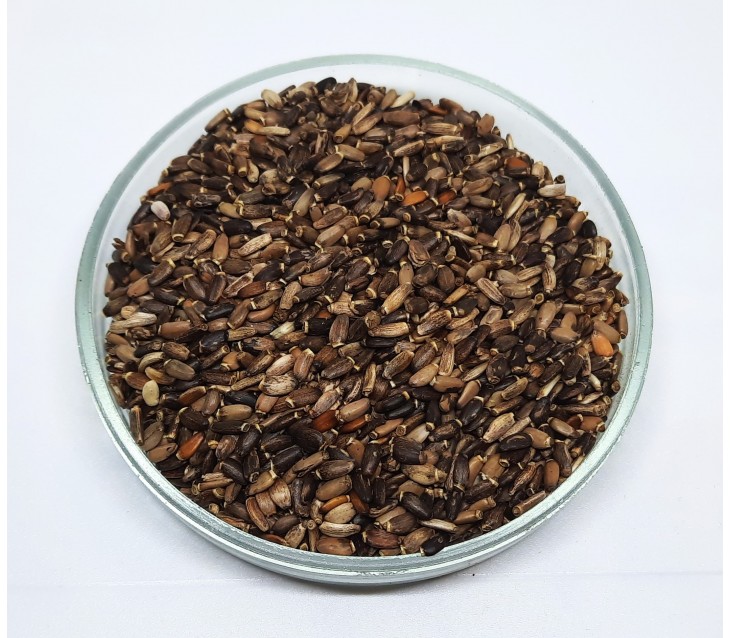Milk Thistle Seeds . Silybum marianum
-
Milk Thistle Seeds | Silybum marianum
Milk Thistle: Benefits and Contraindications
Milk thistle (Latin Silybum marianum) is an annual or biennial plant of the Asteraceae family, which is highly valued due to its medicinal properties. The above-ground parts of milk thistle and its seeds contain biologically active substances. The main biologically active substances of milk thistle fruits are flavonolignans (1.5–3.0%), known under the collective name silymarin. The main components of this complex are silybin, or silibinin (accounting for 60–70%), silychristin (20%), silydianin (10%) and isosilybin (5%). Silymarin is found in all parts of the plant, but its concentration is highest in the fruits.
Beneficial properties
Hepatoprotective action: silymarin promotes the regeneration of liver cells, protecting them from damage caused by toxins, alcohol, drugs and infections. Milk thistle is effective in treating various liver diseases, such as hepatitis, cirrhosis, steatosis, etc.
Antihepatotoxic activity: prevents toxic liver damage. The detoxifying properties of silybinin are explained by the fact that it competes with hepatotropic poisons for a connection with hepatocyte receptors.
Antioxidant properties: silymarin improves the antioxidant protection of cells by binding free radicals, suppressing lipid peroxidation processes and counteracting the depletion of glutathione reserves. This action of milk thistle helps prevent premature aging of cells and the development of chronic diseases.
Anti-inflammatory action: silymarin reduces the production of prostaglandins, leukotrienes and other inflammatory mediators, exerting a general anti-inflammatory effect on the body. Milk thistle can be used for inflammatory diseases of the liver and gallbladder, since it has a pronounced anti-inflammatory effect in the liver tissue, which is realized through various mechanisms.
Choleretic effect: silymarin stimulates the production and outflow of bile, which helps to normalize the function of the liver and gallbladder, prevents the formation of gallstones and the development of cholecystitis.
Hypolipidemic effect: milk thistle helps to reduce the level of cholesterol and triglycerides in the blood, which is the prevention of atherosclerosis, coronary heart disease and other cardiovascular diseases.
Antidiabetic effect: studies have shown that milk thistle can reduce blood sugar levels and increase cell sensitivity to insulin.
Immunomodulatory effect: milk thistle helps to strengthen the immune system and increase the body's resistance to infectious and viral diseases.
Oncoprotective effect: silymarin has anti-cancer properties. Anti-inflammatory, antioxidant and pro-apoptotic properties of milk thistle, together they represent a "functional triad" that allows you to counteract the emergence and progression of mechanisms responsible for the growth and division of tumor cells.
Wound healing and anti-inflammatory effect on the skin: milk thistle tincture and oil can be used externally to treat various skin diseases.
Anti-edematous effect: milk thistle is characterized by a gentle diuretic effect of short action, therefore it helps to reduce swelling and improve microcirculation, especially relevant for liver diseases accompanied by impaired fluid outflow from tissues.
All the above properties of milk thistle make it a valuable plant for use in folk and official medicine. Due to its wide range of action and a relatively small number of contraindications, milk thistle is an effective and safe remedy for the liver and the health of the whole body.
Contraindications
Individual intolerance and allergy: some people may have allergic reactions to milk thistle or its components. If you have allergic reactions to plants of the Asteraceae family (for example, dandelion, chamomile, ragweed), milk thistle should be used with caution or completely abandoned.
Pregnancy and lactation: the safety of milk thistle during pregnancy and breastfeeding has not been studied well enough. Although milk thistle is not a poisonous plant, doctors recommend avoiding its use during pregnancy and breastfeeding to eliminate possible risks to the baby.
Cholelithiasis: in people with gallstone disease, the choleretic effect of milk thistle can provoke the displacement of stones and attacks of pain.
Acute hepatitis and cirrhosis of the liver: in acute inflammatory processes in the liver and in severe cirrhosis, the use of milk thistle may be limited. The doctor will determine how appropriate it is to use milk thistle in a particular case, based on the clinical picture and the patient's condition.
Childhood: the safety and effectiveness of milk thistle in children under 18 have not been studied well enough. In this regard, milk thistle should only be used for children under the supervision of a doctor, who will determine the appropriate dosage and duration of administration.
It is important to remember that self-medication can be dangerous and ineffective, especially in the presence of serious diseases. Milk thistle, despite its beneficial properties, is not a panacea and cannot replace complex treatment prescribed by a doctor. Milk thistle should be used wisely, taking into account the recommendations of a specialist and possible contraindications.

